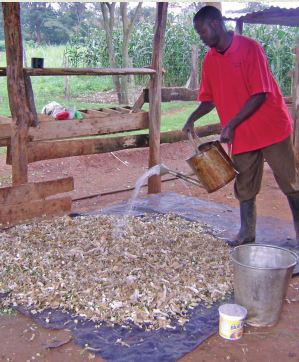Farmers who treat livestock feeds with urea increase the nutritional value of their crop residues two times than those who do not, a 2015 research published in India’s Journal of Agriculture and Veterinary Science reveals.
The report titled “effects of urea treated maize stover silage on growth performance of crossbred heifers” found that urea can be used to supplement cattle’s diet and other ruminants. In this, it helps to maximize the benefits of poor quality grazing by optimizing digestion especially in the dry season.
Crop residues such as maize stovers, wheat and rice straws are low in crude protein content but high in fibre content and hence when offered to livestock they are poorly digested. Urea is non-protein with 46 per cent nitrogen equivalent to 288 per cent of crude protein content.
To improve the quality of maize stovers for instance, there are several steps we recommend.
Related content
Murang’a farmer feeds cows with yeast, improves milk production by up to three litres a day
Homemade dairy feeds cuts milk production costs by a third
Bidco introduces poultry feeds that reduce maturity period in kienyeji chicken, increasing yields
A farmer spraying maize stovers with urea. Photo/KALRO
Chop the maize stovers using a machete/chaff cutter. Weigh 100 kilograms of the material and spread on a polythene sheet. Mix 400 to 500g of urea with four to five liters of water in a garden sprayer. (Urea easily dissolves in water). Sprinkle the solution on the mixture and mix thoroughly using a shovel.
Put the material in the bag as you compact until it fills up. When the bag is full, tie the polythene to ensure it is air tight. A 1.5 to 2m bag can hold 150 to 200 kilograms of the material.
After two weeks, the fodder will be ready as feed to the livestock. In cold areas such as Nyandarua and Limuru open the bag after three weeks.
Animals that are fed on urea treated crop residues increase milk production by 1.25l/day and grow faster hence more income for farmers. The feed can also replace Napier grass in the dry seasons.
Never feed urea to livestock in its granular form or solution form, this may lead to poisoning, bloat and subsequent death of animals.

















Comments powered by CComment